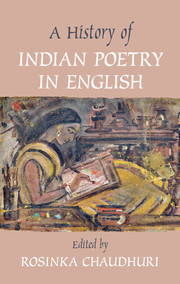Book contents
- Frontmatter
- Contents
- Contributors
- Acknowledgments
- Introduction
- SECTION I THE BROAD NINETEENTH CENTURY: INDIANS IN ENGLISH AND THE ENGLISH IN INDIA
- 1 The First Indian Poet in English: Henry Louis Vivian Derozio
- 2 English Poetry in India: The Early Years
- 3 From Albion's Exile to India's Prodigal Son: The English Poetry of Michael Madhusudan Datta (1824–1873)
- 4 Transforming Late Romanticism, Transforming Home: Women Poets in Colonial India
- 5 The Locations and Dislocations of Toru and Aru Dutt
- 6 Poetry of the Everyday: Comic Verse in the Nineteenth Century
- 7 Toru Dutt and “An Eurasian Poet”
- 8 Rabindranath Translated to Tagore: Gitanjali Song Offerings (1912)
- SECTION II PUBLISHERS, PUBLISHING HOUSES, AND THE PERIODICAL PRESS
- SECTION III POETRY: 1950–2000
- SECTION IV POETS OF THE DIASPORA
- SECTION V THE NEW MILLENNIUM POETS ON THEMSELVES
- Bibliography
- Index
3 - From Albion's Exile to India's Prodigal Son: The English Poetry of Michael Madhusudan Datta (1824–1873)
from SECTION I - THE BROAD NINETEENTH CENTURY: INDIANS IN ENGLISH AND THE ENGLISH IN INDIA
Published online by Cambridge University Press: 05 March 2016
- Frontmatter
- Contents
- Contributors
- Acknowledgments
- Introduction
- SECTION I THE BROAD NINETEENTH CENTURY: INDIANS IN ENGLISH AND THE ENGLISH IN INDIA
- 1 The First Indian Poet in English: Henry Louis Vivian Derozio
- 2 English Poetry in India: The Early Years
- 3 From Albion's Exile to India's Prodigal Son: The English Poetry of Michael Madhusudan Datta (1824–1873)
- 4 Transforming Late Romanticism, Transforming Home: Women Poets in Colonial India
- 5 The Locations and Dislocations of Toru and Aru Dutt
- 6 Poetry of the Everyday: Comic Verse in the Nineteenth Century
- 7 Toru Dutt and “An Eurasian Poet”
- 8 Rabindranath Translated to Tagore: Gitanjali Song Offerings (1912)
- SECTION II PUBLISHERS, PUBLISHING HOUSES, AND THE PERIODICAL PRESS
- SECTION III POETRY: 1950–2000
- SECTION IV POETS OF THE DIASPORA
- SECTION V THE NEW MILLENNIUM POETS ON THEMSELVES
- Bibliography
- Index
Summary
The early English poetry of Michael Madhusudan Datta (or “Madhusudan,” as he is known by current scholarly convention), the mid-nineteenth-century Bengali poet and playwright, cannot be fully understood in isolation from his later Bengali oeuvre. Scholarship on Madhusudan's works has tended to focus either on his earlier English works as part of the history of Indian poetry in English, or on his later Bengali works as part of the history of Bengali literature, or on the moment of the poet's transition from English to Bengali as his language of poetic composition and the implications of this transition (in the 1850s Madhusudan forsook his ambition to become a noted English language poet and began instead to compose literary works in Bengali). However, scholars rarely seek to trace or foreground the continuities between the two linguistic parts of his oeuvre. This may well be because Bengali scholars and those scholars with enough of the language to speak to Madhusudan's Bengali works (which are more novel and, for the most part, more sophisticated than his English oeuvre) tend to focus primarily on these, while scholars who only have access to his English poetry (and to translations of that small part of his Bengali oeuvre which has been translated into English) are unable to engage in a detailed or thoroughgoing analysis of his corpus of Bengali works.
For these reasons, insufficient attention has been paid to the way in which the arc of Madhusudan's career as an English language poet reveals that another juncture, just as critical to the shape of his oeuvre as a whole as his shift from English to Bengali composition (in the late 1850s), came toward the end of Madhusudan's time as a student at the famous Hindu College in Calcutta (late 1842/early 1843). Poems like The Upsori and King Porus, which mark the beginning of the poet's new phase in late 1842/early 1843, have less in common with the poet's earlier English works than they do with later English works such as The Captive Ladie (1849) or later Bengali works such as Madhusudan's epic Meghnādbadh Kābya (1861). It is not clear what exactly prompted this earlier shift in Madhusudan's literary practices in the early 1840s.
- Type
- Chapter
- Information
- A History of Indian Poetry in English , pp. 48 - 63Publisher: Cambridge University PressPrint publication year: 2016



